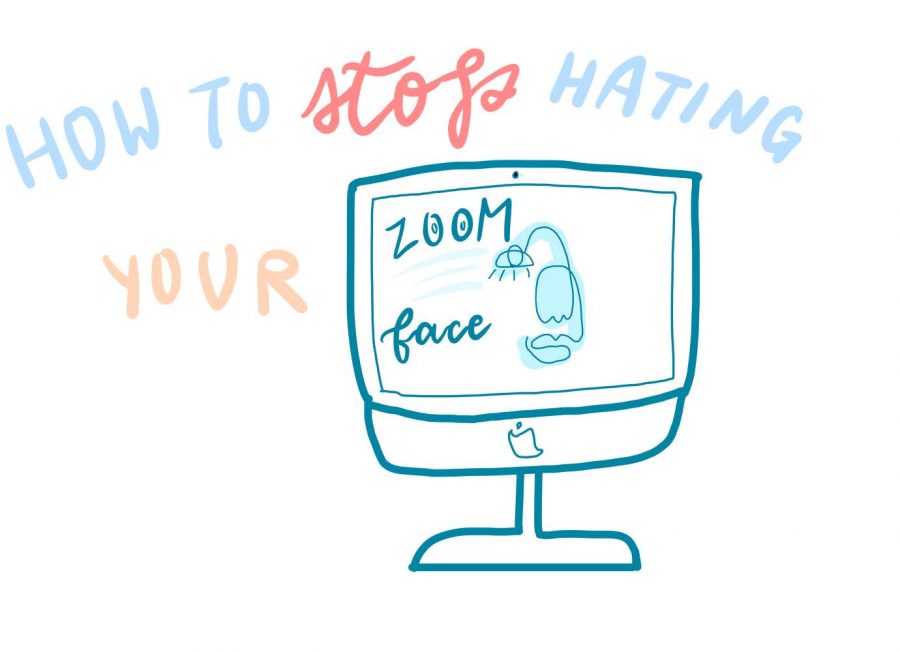How to Stop Hating Your Zoom Face
How to stop hating your “Zoom face” | artist: Gia Shin
November 4, 2020
As someone who resents almost every photo after it’s taken, I cannot stand staring at my face on video calls for hours on end. After jumping from one Zoom call to another every day, it is safe to say that I have grown tired of looking at the tiny highlighted box in the corner of my screen. Zoom face, a quarantine-specific phenomenon when you notice flaws you were once oblivious to, has been on the rise. Though the Zoom format is designed so you could focus on others, I can’t help but think, is this what I look like to others in real life?
Some people are beginning to despise their faces for the first time since entering the world of video conferencing, and growing up with social media has only perpetuated the problem. On social media, we post the best picture usually with a filter and a caption. We have become skilled at putting a filter over images as a way to mask our struggles. According to the Dove campaign, 92% of teen girls would like to change something about their appearance, and the National Report on Self Esteem found that 98% of girls believe external pressures are causing them to feel like they have to look a certain way. We have an entire generation growing up with less self-esteem compared to any other generation, and staring at our own faces for hours at a time only makes it worse.
Even Zoom offers the “touch up my appearance” option which you can activate with a click of a button. It ever-so-slightly cues on the expectation that our natural selves are not good enough on its own. Dermatologist Shereene Idriss said, “I think this experience is going to be a highly condensed version of reality that’s been going on over the last couple of years with filters and social media and Instagram, but it’s going to happen at an accelerated rate because people are going to be looking at themselves more.”
However, it is not only our brains to blame here. Unlike a classroom setting where we can view everyone’s entire bodies, only our faces are framed on camera, thus causing us to be more self-aware. But many video conferencing apps, including FaceTime, can distort some of our proportions due to its wide camera angles. According to psychologist Yvonne Thomas, it “can cause shadows around the eyes and nose, highlight one’s facial imperfections like blemishes and wrinkles and add enough bloating that it can look like one has a double chin.”
FaceTime and Zoom also mirror our cameras, allowing us to be seen as the outside world does. Though the differences between this image and our reflected selves are hardly noticeable, our brain is quick to identify features that seem “off.” We constantly see our appearance as it is presented in a mirror: when we get dressed, comb our hair, or wash our hands. This mirrored version of ourselves is what we’ve grown accustomed to and what we like to see. In other words, we tend to like our faces when they’re only backwards.
So, what can we do to reduce the repulsion of our own faces on Zoom?
1. Hide your self-view
Hiding your camera so you’re only focused on the speaker is one way to avoid staring at your pores during class. You might prefer to look at those who are speaking and not anyone else. But if hiding your self-view and staring at that green light next to your camera will only make you feel self-conscious, or if you’re worried about how you look to others when you can’t even see yourself, this may not be the solution for you.
2. Put it into perspective.
Ultimately, stressing out about our appearance on Zoom is admittedly, a privileged problem. At the end of the day, we’re all preoccupied with worrying about ourselves and we’re our own worst critics. Though the reality might seem harsh, “nobody really cares what you look like at eight in the morning,” said Sarah Lee (’24). Of course, there is no harm in wanting to look good on Zoom. Fixing your lighting or repositioning your laptop is hardly any different than doing your hair or putting on makeup. Displaying good will help you feel good, too. “We’re stuck with ourselves and the number of times we’ve looked at ourselves in the mirror; the number of times we’ve seen pictures of ourselves—we always try to make things worse than they really are,” said Ryan Kim (’23). “It’s upsetting, but at the same time, expected. I don’t think we can expect ourselves to be that fond of ourselves.”
3. It’s all about self-love.
Use this as an opportunity to embrace all of your image, and that includes your imperfections. We must acknowledge our feelings and understand that some things are not in our control. “We have this idea where there is such a large range of narcissism,” said Kim. “I think people mistake self-loathing for humbleness and I think that this starts with recognizing that you’re not perfect, and you never will be. Then, accept that no one cares about what you’re doing or what your hair looks like.”. Instead of nit-picking at your insecurities, challenge yourself to be grateful for what you already have and reroute your brain from negative thoughts. And that might be as simple as “I am grateful to have two eyes” or “I have a pretty smile.” The next time you hop on a call, remind yourself that you are not your Zoom face.

















































































































































